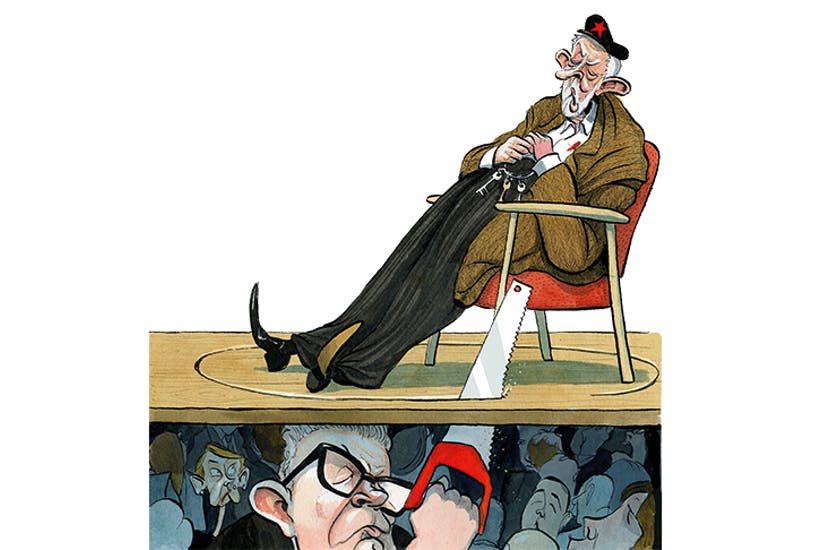If the British Labour party were serious about stopping the most right-wing Conservative government within living memory, it would revolutionize its approach to politics. Clearly, it would have to remove Jeremy Corbyn as leader. Ideally, Corbyn would remove himself. He would not allow the struggle to force him out to waste precious time. He would look at his leadership ratings, ask himself why Labour was not 20 or 30 points ahead of a dire government, and conclude that, in the interests of the party and country, it was time to retire with dignity.
With their leader duly patted on the back and sent on his way, Labour Members of Parliament would then game the system to avoid a second venomous round of faction fighting. There is not enough time for a leadership contest between now and a fall general election. In any case, Labour needs to be talking to the country not to itself. MPs would thus agree to unite behind one candidate, and obviate the need for a divisive leadership race. They would cut out the members and the hustings, and concentrate on the urgent task at hand
Before deciding on a unity candidate they would ensure that he or she had the widest possible appeal, and not just within the Labour party. Leading Labour figures would consult with the Greens, Liberal Democrats and Plaid Cymru about who could best lead the opposition to the conservatives. Labour would offer them an electoral pact. It would stand down in seats it could not win and vice versa. Constituencies where several parties had a claim to be the best-placed challenger would be shared out in an open and generous spirit. (I exclude the Scottish National party from this list because its position is so dominant in Scotland I cannot see it cooperating with anyone, although if it were serious about stopping Brexit it too would ally with Remain parties.)
The unity candidate would tear up the old party mindedness and focus solely on how best to beat Boris Johnson and Nigel Farage. He or she would be committed not only to a People’s Vote but to campaigning to keep Britain in the European Union. For the first time, we would have a leader of the opposition, who actually opposed and harried Tory ministers and made the case against leaving. The best elements of the modern liberal left, particularly among the young, don’t care much about party labels. They are free-thinking and anti-sectarian. They don’t parrot ‘Hate Brexit, Love Corbyn’ or ‘Labour till I die’ and expect to be applauded for their intransigence rather than condemned for their conformity,
All sides would approach the negotiations encouraged by that greatest of all motivators: fear. Politics today is a contest between two weakened fighters. The first side to pull itself together, even partially, will triumph. The winning side does not have to sweep the country. It needs only to be in slightly better shape than its opponent, and be able to cobble together 35 percent or so of the vote – maybe less. With politics so fragmented, and the first-past-the-post system so twisted, that might be enough for a healthy majority. (Labour won a majority of 66 in the 2005 general election with just 35.2 percent of the vote after all.)
Think of left and right as two drunks fighting in a pub car park or two soccer teams threatened with relegation. They are terrible fighters and footballers. But all that matters to the winning side is that they are less terrible than their opponents are.
Alastair Campbell’s letter to Jeremy Corbyn outlined how the right could land a punch. Boris Johnson, and indeed much of the right, has been busily constructing a stab-in-the-back myth to explain away the pain we might suffer.
He will blame the European Union, parliament and the civil service for failing to get a Brexit deal – anyone but himself. Having boxed himself in with promises that cannot be met he will use an election to secure legitimacy for a no-deal Brexit. As Campbell writes:
‘He rightly fears that if the people were given a straight choice in a referendum – “no deal v no Brexit” – no Brexit would win, comfortably. But he is confident that in an election choice between him and you, he would win, and so get the mandate for the hardest form of Brexit he would otherwise not legitimately be able to claim.’
As Labour has no strategy, a stale and unpopular leader, and has been speaking with forked tongue on the great issue of the day, Johnson can expect to reunite the right, or enough of the Brexit party to beat a divided center-left. The task of the center-left is to stop him.
I’ll leave it now. To even imagine a realignment is to engage in pure fantasy. I might as well be arguing for universal peace or the second coming of Christ. I have set out what should be done because I want to show you how absurd the position of the British center-left has become.
A tactical ploy to get round the biases of a first-past-the-post electoral system should not sound as Utopian as heaven on earth. For people who placed influencing their country’s future above engaging in tribal warfare, adjustments to changing political realities should come naturally. As it is, the leaders of the centre-left con themselves and their supporters into believing that there is no need to change.
It is true that what William Goldman said about Hollywood applies as well to British politics:
‘Nobody knows anything…not one person in the entire motion picture field knows for a certainty what’s going to work.’
As the pound falls and reality starts to bite, support for Brexit may fall apart. Corbyn supporters can argue that their leader was hugely unpopular in 2017 but still managed to attract enough voters to deny the Conservatives a majority. Maybe it will happen again. Maybe not. Nobody knows anything.
But I know this. If there is a hard Brexit or a no-deal Brexit, and if Johnson beats Corbyn in a general election, the recriminations on a center-left that failed to do everything in its power to stop him will be as great as the chaos in the country.
This article was originally published onThe Spectator‘s UK website.

























